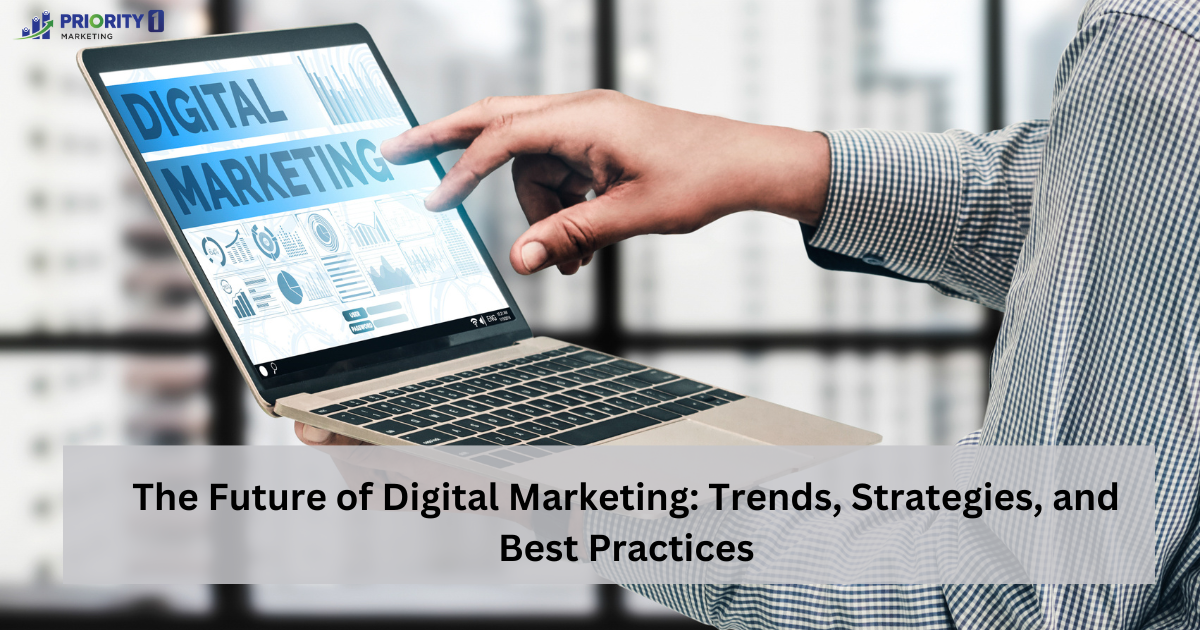The Future of Digital Marketing: Trends, Strategies, and Best Practices
Digital marketing is the process of using online platforms, tools, and strategies to promote products and services. With businesses shifting towards the digital space, the competition to capture audience attention has become fierce. Brands are now leveraging search engines, social media, content marketing, and email campaigns to engage with their target customers more effectively.
This shift in consumer behavior has made digital marketing an essential part of any business strategy. Unlike traditional marketing methods, digital marketing offers measurable results, real-time engagement, and a global reach. It allows businesses to analyze their campaigns’ performance and make data-driven decisions to improve their marketing efforts.
Why Digital Marketing Matters in Today’s Business Landscape
The internet has changed how people consume information, shop, and interact with brands. Businesses must adapt to these changing behaviors to remain relevant. Digital marketing is essential because it helps brands:
- Reach a broader audience
- Create personalized experiences for customers
- Build stronger brand awareness
- Generate leads and increase sales
- Track performance and optimize marketing efforts
With technology constantly evolving, digital marketing continues to play a crucial role in driving business success. Companies that fail to implement effective digital strategies risk falling behind their competitors.
Core Components of Digital Marketing
Search Engine Optimization (SEO)
SEO is the backbone of digital marketing. It involves optimizing a website to improve its visibility on search engines like Google. Effective SEO strategies include keyword research, high-quality content creation, backlink building, and improving website speed. A well-optimized site attracts organic traffic and improves conversion rates.
Content Marketing
Creating valuable and relevant content is one of the most effective ways to engage potential customers. Blogs, videos, infographics, and social media posts help businesses educate their audience and establish authority in their industry. When content is informative and engaging, it builds trust and encourages customer loyalty.
Pay-Per-Click Advertising (PPC)
PPC campaigns allow businesses to target specific demographics and drive immediate traffic to their websites. Platforms like Google Ads and Facebook Ads enable brands to display their ads to users actively searching for relevant products or services. Unlike organic traffic, PPC advertising ensures that businesses appear at the top of search results instantly.
Social Media Marketing
Social media platforms such as Facebook, Instagram, Twitter, and LinkedIn provide opportunities for brands to connect with their audience. By sharing engaging content, running paid ad campaigns, and interacting with customers, businesses can strengthen their online presence and increase brand awareness.
Email Marketing
Despite the rise of social media, email marketing remains a highly effective way to nurture leads and maintain customer relationships. Personalized emails, newsletters, and promotional offers help businesses engage with their audience and encourage repeat purchases.
Affiliate and Influencer Marketing
Partnering with influencers and affiliates is another powerful strategy for expanding reach and credibility. Influencers with a loyal following can promote products and services to their audience, generating higher engagement and trust.
Latest Trends in Digital Marketing

Artificial Intelligence (AI) and Automation
AI is revolutionizing digital marketing by automating processes such as data analysis, customer segmentation, and personalized recommendations. AI-driven chatbots enhance customer support, while automation tools improve campaign management and performance tracking.
Voice Search Optimization
With the growing popularity of voice assistants like Alexa and Siri, businesses need to optimize their content for voice search. Using conversational keywords and answering direct queries can improve search rankings and enhance the user experience.
Video Marketing
Videos are becoming the preferred form of content consumption. Short-form videos, live streams, and interactive content engage audiences more effectively than traditional text-based content. Businesses should incorporate video marketing into their strategies to capture user attention.
Personalization and Data-Driven Marketing
Consumers expect tailored experiences based on their preferences and behavior. Brands that use data analytics and AI to deliver personalized recommendations, emails, and advertisements can build stronger relationships with their customers.
Augmented Reality (AR) and Virtual Reality (VR)
AR and VR technologies are transforming the way consumers interact with brands. Businesses in the retail and real estate industries are using these innovations to provide immersive experiences and product demonstrations.
How Businesses Can Leverage Digital Marketing for Success
Set Clear Objectives
Before launching a campaign, businesses should define their goals, whether it’s increasing website traffic, generating leads, or boosting sales. Setting clear objectives helps in measuring success and optimizing marketing efforts.
Know the Target Audience
Understanding customer demographics, interests, and behaviors allows businesses to create more effective and relevant marketing strategies. The more a company knows about its audience, the better it can tailor its messaging and campaigns.
Optimize for Mobile Devices
With most internet users accessing websites via mobile devices, businesses must ensure their sites are mobile-friendly. A responsive design improves user experience and enhances search engine rankings.
Leverage Data Analytics
Data-driven decision-making is essential for digital marketing success. Using tools like Google Analytics and social media insights, businesses can track performance, identify trends, and refine their strategies for better results.
Engage with Customers Regularly
Customer engagement is key to building brand loyalty. By responding to comments, conducting surveys, and providing valuable content, businesses can strengthen relationships and encourage repeat business.
The Role of Digital Marketing in the Real Estate Industry
The real estate industry has greatly benefited from digital marketing strategies. Businesses in this sector use digital tools to reach potential buyers, showcase properties, and generate leads. A real estate digital marketing agency specializes in helping property developers, brokers, and agents create targeted online campaigns to attract clients.
Through real estate digital marketing, businesses utilize SEO, paid ads, and social media marketing to highlight properties and connect with interested buyers. High-quality visuals, virtual tours, and interactive listings make digital marketing an essential part of selling real estate.
Many companies rely on real estate marketing agencies to handle their digital campaigns. These agencies focus on improving brand visibility, driving traffic to property listings, and increasing conversion rates. By leveraging digital strategies, real estate businesses can stay ahead in a competitive market and generate more sales.
Conclusion
Digital marketing continues to evolve, shaping the way businesses connect with their audiences. By implementing SEO, content marketing, PPC, social media engagement, and AI-driven strategies, companies can enhance their brand presence and increase revenue.
Staying updated with the latest trends and leveraging data-driven insights will help businesses stay competitive in the digital landscape. Whether in real estate or any other industry, having a strong digital marketing strategy is crucial for long-term success.














Post Comment